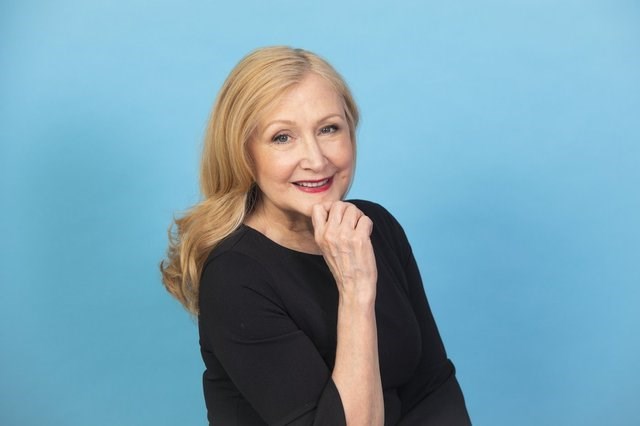
Patricia Clarkson poses for a portrait on Thursday, May 8, 2025, in New York. (Photo by Andy Kropa/Invision/AP)
Republished May 14, 2025 - 10:42 AM
Original Publication Date May 14, 2025 - 9:16 AM
NEW YORK (AP) — The film “Lilly,” a biopic about the equal pay icon Lilly Ledbetter, lands in theaters at a difficult time for her biggest political and civil rights champions.
Many are gone or out of power, their hopes of building on Ledbetter's legacy interrupted by a more fundamental fight over President Donald Trump’s shake-up of civil rights institutions.
It's difficult not to flashforward to the present as the most famous of those supporters appear in interspersed documentary footage: the late Supreme Court Justice Ruth Bader Ginsburg, former Secretary of State Hillary Clinton, former first lady Michelle Obama and former President Barack Obama, who signed the 2009 Lilly Ledbetter Fair Pay Act, which strengthened the right of workers to sue for pay discrimination.
Less well-known is Jocelyn Samuels, played as a key character by Deirdre Lovejoy. Back then, Samuels was an executive at the National Women’s Law Center, guiding Ledbetter through the halls of Congress as they lobbied for the law. Currently, Samuels is one of two Democratic commissioners fired by Trump from the Equal Employment Opportunity Commission, an unprecedented power play she is fighting in a lawsuit.
Ledbetter died in October at the age of 86. The following month, Trump's election all but dashed Democratic hopes for passage any time soon of the more comprehensive Paycheck Fairness Act, which Ledbetter championed and would, among other measures, strengthen the ability of the EEOC to investigate pay discrimination.
Patricia Clarkson, who stars as Ledbetter in “Lilly,” doesn't shy away from the politics of the film, directed by Rachel Feldman. The Academy Award-nominee shared the red carpet with Clinton, who made a surprise appearance at the film's May 7 premier in New York City. She often recalls how her own mother, the late former Louisiana state legislator Jackie Clarkson, cried for joy when learning her daughter would play Ledbetter.
In an interview with The Associated Press, Clarkson said the politics are a salient backdrop for what people should remember most: The resilience of a woman, who for most of her life, was an unknown working mother until an anonymous note tipped her off that her male co-workers were getting paid thousands of dollars more for the same job, and she decided to fight back.
The conversation has been edited for brevity and clarity.
Q: What did you do to prepare for the role? I understand you never met Lilly Ledbetter and it that it was an intentional choice.
A: I imprint very easily with people and so I was afraid if I met Lilly, I would try to imitate her, play her. I realized that I owed her the very best of me as an actress, as a woman and a person. And the way to do that is to bring the best of you and to bring the best of yourself emotionally and physically and intellectually. And you can't do that if you are living with such an image. And Lilly is a very powerful image in my life. And so I had to kind of just bring her back to an ordinary life.
Q: Did you did you dig into her writings or her speeches?
A: I looked at a certain amount ... But I wanted her emotional life ever-present ... That's what's important because change is hard and people suffer to fight injustice .... I didn’t care about mannerisms. I just wanted her emotional strife and struggle to be present.
Q: It must have been hard to anticipate how different the political moment would be when the movie was released.
A: I literally and figuratively had dreams of being on a press tour with Lilly. It was going to be the highlight of my life to be with this remarkable human being ... but then she passed. But maybe right now, is the greatest time for this film because it’s reminding people that there can be accomplishments.
Q: Is it a more difficult political climate for a film like this?
A: I know the Democrats embraced her but let me tell you something: Lilly was not really a deeply political person, and that’s something I held strong to ... And yeah, she spoke at the (Democratic National Convention) but she would have spoken at the (Republican National Convention) if she has been asked. Equal pay is equal pay. Whether you are North, South, East, West, whether you were red, blue or purple. She didn't care.
Q: You also recently starred in ‘She Said,’ the 2022 film about the New York Times’ uncovering of the sexual assault allegations against Harvey Weinstein. What are the parallels with ‘Lilly’?
A: It’s all of a piece. It’s a mindset of certain men we have had to work with, either in Hollywood or in the workforce ... Hollywood’s come a long way because I’ve been in it since 1985, and I’ve spoken about this. We used to meet male producers and directors in hotel rooms and actors in hotel rooms, and we all thought that was fine. We were paid less throughout. I was paid less throughout the whole beginning of my career.
Q: If there’s one thing that you want the audience to take away about Lilly, what would it be?
A: She got back up, and you should be a proud American when you watch her.
_______
The Associated Press’ women in the workforce and state government coverage receives financial support from Pivotal Ventures. AP is solely responsible for all content. Find AP’s standards for working with philanthropies, a list of supporters and funded coverage areas at AP.org.
News from © The Associated Press, 2025